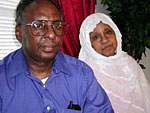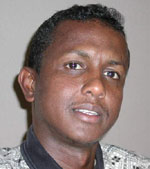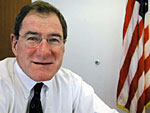By Mary Losure
Minnesota Public Radio
September 9, 2002
Minnesota is home to one of the nation's largest Somali populations. As Muslim immigrants, they felt the shadow of suspicion fall on them after Sept. 11. Now, the after-effects still ripple through their community.
| |
|
|
|
||
Every day, Osman Mohamud Amed listens to the Somali language broadcast on the BBC, to hear news of a country he no longer calls home. He and his wife and children fled from Somalia's civil war in 1991 and now live in St. Paul. For years, they've been trying to bring her 77-year old mother and two other relatives to join them.
"First we applied in December, 1998, but they sent us back one paper to correct one name," remembers Amed, "because for the middle name we wrote the initial only, and they said you must write full three names."
Finally, the family learned that their relatives had been given case numbers and scheduled for an interview and screening. It was to take place in October of 2001. "But because of Sept. 11, they delayed, they cancelled, that interview, and since then, they have not called back."
Dr. Abdulrahman Muhamed has seen a different story.
Many of his patients are Somali refugees who suffer from post-traumatic stress from their experiences in Africa. After Sept. 11, he says a number of those patients had to be hospitalized.
One was a young woman who was 12 years old when her family was killed. She spent years as a refugee before coming here.
"She's happily married with children, and early October of last year she had a complete mental breakdown, where one night she woke up claiming that she knew who's responsible for the events of Sept 11, and named names, and completely had a total breakdown," says Muhamed.
| |
|
|
|
||
He says other factors added to the stress on Somalis. In November, President Bush announced that a Somali-owned money wiring service called Al-Barakaat was linked to terrorism.
The government claimed the company was skimming money and funding terrorist groups.
In Minneapolis, federal agents shut down five wire service offices used by Somali immigrants to send money to relatives in Africa.
"When Al Barakaat was closed, everybody felt that others will be closed. Families back home were calling, [saying] 'Will I be getting this month's money, what's going to happen?'" Muhamed says. "People here didn't know. Some people here even went so far as, 'Should I even go to these places to send money? What if I'm accused of sending money?' Some people came to me, and said 'Can I go to this one that's open? Can they trace me back?' We tell them sending money is not a crime."
Last month, the U.S. Department of Justice removed two of the wire services from its terrorism list. Nearly $500,000 will be returned to customers, mostly Somali immigrants. A year later, no terrorism related charges have been filed against any of the closed businesses.
But the wire service shutdown was not the only problem.
The traditional headscarves of Somali women make them highly visible as Muslims. After Sept. 11, Somalis such as Abdulkadir Addow feared anti-Muslim backlash. "Like for instance my wife, right after Sept. 11, I won't let her go to the grocery store after dark just by herself and that fear has never been there, never been an issue for us before Sept. 11."
| |
|
|
|
||
Addow says sometimes when his family is out walking, people yell slurs at them, and he worries about how that will affect his four young children.
"One little story I would like to share with you, is my boy who was 6 years old, a first grader, last year has been hearing a lot about Osama bin Laden, and the government looking for him. And he asked me one day, he said, 'Is the government looking for this man to kill?' Because that's what he's been hearing. And I said yes. And he said, 'Is the government going to kill us, and all Muslims?' He's 6 years old."
In December, the FBI and local law enforcement officers begin questioning recently immigrated Muslim men. In February in an unrelated incident, 10 Somali men from Minnesota were deported. Addow says such news spreads quickly in the tight-knit Somali community.
"What we hear in the community -- so and so has been detained, so and so has been deported, so and so has been interrogated, all that kind of things -- will also create more fear. So and so's, you know, application for citizenship has been denied. I'm not saying they're not doing their job, the INS, but I'm saying, why now?"
A spokesman for the Immigration and Naturalization Service says Somali deportation numbers have not increased and have no connection to the events of Sept. 11.
The spokesman says the rate of denial of citizenship applications varies from year to year, but has actually gone down since Sept. 11.
U.S. Attorney for Minnesota Tom Heffelfinger believes the fear expressed by the community stems partly from Somalis' mistrust of authority, due to their experiences in their home country.
| |
|
|
|
||
He says added to that is a refugee population's unfamiliarity with the American system.
"I recall one community meeting in December where a lady who had come to the United States within the last year and spoke no English was asking me if was true that the FBI could watch her every time she turned on her television set," he says.
Heffelfinger says his office has been working hard to reach out to the Somali community. It's partly to gather information from recent immigrants who may know about terrorist groups operating in their home country. He says it's also because his office wants to learn of civil rights violations that may be committed against Somalis.
Not all Somalis say they're afraid.
Hani Hussein says other than one person who spit at her after Sept. 11, she has not experienced any problems. She says, instead, many Americans have made an effort to learn more about Muslims and their culture. "We talk about Sept. 11 and [they] come to find out exactly who I am, and what I stand for. My beliefs and my opinion of things. That I'm a person of peace," says Hussein.
On a hot Friday afternoon, Hussein and other worshippers sit on carpets on the floor and listen to the sermon at the Al Taqwa Mosque in St. Paul. The Imam urges them to be strong at a difficult time for Muslims across the world. Then the final prayers begin.
On the walls are photographs of mosques in other countries. One shows an interior with tall marble columns and intricately patterned floors. Another shows a vast dome gleaming against the sky. But here, the mosque consists of a few rooms above an Asian grocery store. Soon, the doors will open and Hussein and the others will walk downstairs into the outside world.
More from MPR



